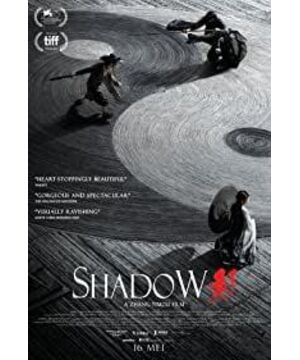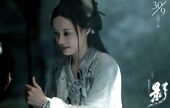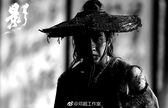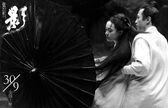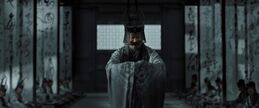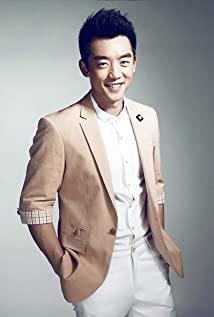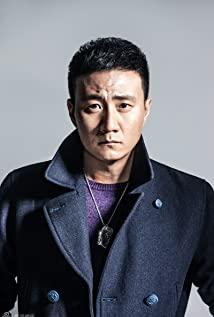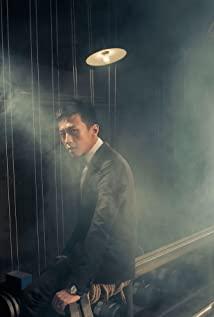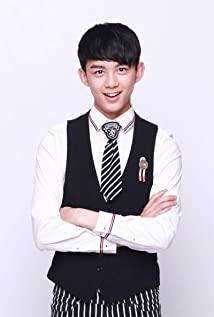"National Teacher" Zhang Yimou, a representative figure in the fifth generation of Chinese directors, his level and ability are naturally beyond doubt...
But it is such a master-level director who has also made the bad film "Three Shots and Shooting the Table Surprise" and "The Great Wall", which was scolded by the audience two years ago...
As for why he chose to shoot "The Great Wall" in the first place, Zhang Yimou was quite sincere in Xu Zhiyuan's program "Thirteen Invitations"
Frankly speaking, the old-fashioned Great Wall's script, coming to China for bedding, wrote that China is not like China, but because of the agent's remarks, I had mixed thoughts in my heart:
Director, have you ever thought about such a thing?
Talk about a Chinese movie
in the whole world
First week in 150 countries
bloom at the same time
if you don't pick up
You may not have this chance
As a typical idealistic cultural person, Xu Zhiyuan asked Zhang Yimou: Don't you have the desire to transcend the times?
Zhang Yimou said with a simple and honest smile: This thing is just a matter of people taking tea and cooling, and it is beyond the times. It is good to be yourself.
The words revealed the helplessness of being in the capital market, but this time Zhang Yimou was no longer involuntarily.
After watching the nearly two-hour "Shadow", you will find that Zhang Yimou is shooting himself, a story in which he is in the capital market, loves and kills with capital, and achieves mutual compromises and breaks with each other.
one
Zhang Yimou has always wanted to make a subrogation-themed plot film, but films such as "Hero" and "House of Flying Daggers" were always incompatible until he read Zhu Sujin's "Three Kingdoms: Jingzhou"
It's just that there were too many changes to the script. Later, Zhang Yimou simply made up history and made up a historical space (Peiguo).
Pei Guo has a governor named Zi Yu (played by Deng Chao), who is more than 10,000 people under one person. He was seriously injured in the duel with the enemy war god Yang Cang (played by Hu Jun).
In order to hide from the public, Ziyu uses his family as his substitute, Jingzhou (played by Deng Chao).
(The stronger one on the left is the stand-in Jingzhou, and the thin one on the right is Ziyu)
Jingzhou went to court for him and fought for him, and Jingzhou was Ziyu's "shadow".
The real body, Yu, trapped himself in a dark stone room, thinking about his "big chess game":
Let Jingzhou go to Yang Cang for a duel. In the midst of chaos, he took the opportunity to let his subordinates lead the dead to take down the opponent's city, and finally kill King Pei (played by Zheng Kai), becoming the new "lord" himself.
(On the surface, King Pei, who has no imperial temperament, is arrogant.)
From Zi Yu's point of view, he managed to strategize himself, whether it was Jingzhou, his wife Xiao Ai, or even King Pei, they were just his own pawns.
In fact, although King Pei seems to be arrogant on the surface, he is actually thinking about his "chess game":
He realized that Jingzhou was a shadow, so after the city was recovered, he rescued Jingzhou, which was almost wiped out by Ziyu, and quietly sent troops to Ziyu's dark room to secretly execute Ziyu.
In the eyes of King Pei, I am the god of Pei Kingdom. If you want to replace him, then I will make it real and let Jingzhou completely replace Ziyu.
In this open and secret struggle between monarch and minister, "Shadow" Jingzhou is very clear that he can't escape the fate of "chess piece", but he should never fall in love with Ziyu's wife Xiao Ai (played by Sun Li)
Therefore, Jingzhou is willing to be repeatedly ravaged in this vortex of monarch and minister power...
two
In my opinion, Zhang Yimou's "Shadow" is just a "wonderful" movie, but it is far from a classic...
What is "wonderful"? The way of Fu Hua Dao is very elegant, the ink and wash style is very beautiful, and the composition is amazing, but the story pattern and the character facial makeup are the flaws of "Shadow".
Zhang Yimou, who was born in the Department of Photography, is definitely an art master who is unmatched in the domestic film industry.
It is difficult for others to make pictures of magnificent, interspersed landscapes, and epic reproductions, but it is easy for Zhang Yimou to do so.
Of course, "Shadow" doesn't have the big scenes he's used to in the past this time, and it doesn't have the splendor he is best at (golden armor all over the city, ambush from all sides).
The tone of the ink painting style is really beautiful. The black and white in the ink painting are scattered and intertwined, which is the background color corresponding to human nature.
Once the color tone is set, the rainy weather from beginning to end will naturally be set, so as to be worthy of the turbulent temperament hidden in the hall.
As for the story and characters, it's really debatable.
How did 100 people on death row kill 800 defenders? Who exposed the location of Ziyu's stone chamber? If I had known that there was an underground passage to enter the Jingzhou city, why didn't we sneak attack earlier...
As for the characters I said about being masked, the characters of all the characters are rarely reversed, and they lack a sense of incomprehension that directly hits people's hearts.
When you see the eldest princess, you know that she is competitive; when you see Ziyu, you know that he is treacherous and cunning; when you see Yang Cang, you know that he is a military general and doesn't know how to adapt...
(Yang Cang, the god of war played by Hu Jun)
And the protagonist Jingzhou should be the easiest character to enter the audience's psychology, because everyone always sympathizes with the weak
Jingzhou, who came from a commoner, is a chess piece in the hands of princes and nobles. He suffers every night because he is confused about his own identity. Who is he?
However, the film did not dig deep into this character, but at the end of the film, it directly gave Jingzhou a dramatic change, suddenly changing from a "chess piece" to a "chess player"
(At the moment of escaping from a mortal chess game and entering the court, Jingzhou changed from a chess piece to a chess player)
Here's a mention, Director Zhang played with violent aesthetics this time, showing bloody scenes very bluntly, and having psychological expectations before watching.
three
For the actors in "Shadow", there is really nothing to criticize.
Even Wu Lei and Guan Xiaotong, who are worried by many people, I think it's okay, interpreting the young people in the power field, young and arrogant, arrogant, and eventually become victims of the power struggle, who can't see their fate until death. puzzle.
Tian Zhan, played by the main supporting character Wang Qianyuan, has nothing to do with the overall situation, but one thing is that the performance is too forceful and a bit deliberate, which should not have happened to an old actor like him.
(Tian Zhan played by Wang Qianyuan)
Xiao Ai, played by Sun Li, has a unique classical beauty, which makes people feel pity and love.
The protagonists Deng Chao and Zheng Kai must be praised!
Deng Chao plays two roles, one is yin and the other is yang, Ziyu is sinister and sinister, skinny, and Jingzhou is strong and strong, full of masculinity.
For this movie, Deng Chao became strong first and then thinned, over a weight difference of more than 40 pounds. This kind of huge physical and psychological change is very tolerable.
Deng Chao's role in this movie is really successful. Facts have proved that when Deng Chao plays the drama seriously, he is the best actor.
As for Zheng Kai, I was really surprised. Before that, I only thought he was a variety show artist, but as soon as he appeared in "Shadow", I was attracted to him.
He plays King Pei, who hides a needle in the cotton.
And Zheng Kai's line skills are so good that he will definitely give the audience a bigger surprise when he concentrates on movies in the future...
wantonly
Shadow is certainly not a story of power and killing, it is a story of manipulation.
Ziyu manipulated Jingzhou to kill the target, and King Pei manipulated Ziyu. In fact, King Pei was also manipulated by power...
Zi Yu thought that "there is no real body, so how can there be shadows", but in fact "there is no real body, but there are shadows".
The shadow is also the real body, and he already exists.
To put it bluntly, Zhang Yimou shot himself, a Zhang Yimou manipulated by capital.
The great success of the opening and closing ceremonies of the 2008 Beijing Olympic Games made Zhang Yimou firmly seated as the "national teacher".
From then on, all the films were shot by princes, nobles, and dignitaries. They seem to be high-end and free. However, in the capital chess game, how can there be any freedom at all? ...
A Sino-foreign joint venture "The Great Wall" made him trapped in it for three and a half years and couldn't get out of it. Anyway, this time he finally persuaded the capitalists to happily be "oneself" and film this "Shadow".
"The Screen", a well-known American film magazine, commented: "His previous "Return" is a work with a soul but no big scenes, "The Great Wall" has a big production but no soul, and "Shadow" combines the two, with both Great spectacle with a compelling narrative."
High praise abroad, shortlisted for the Golden Horse Award in China, Lao Mouzi is really comfortable doing what he does this time.
Zhang Yimou, who is already in his twilight years, has always lived in the "useful" philosophy of the world. Even though he has become famous all over the world, he still makes movies one after another, trying one genre after another.
This has something to do with his upbringing. His father was a Kuomintang officer, and he was also affected by politics when he was young, so he always believed in being a useful person who could play a role in the game of chess.
Everyone who is a chess piece probably wants to be a chess player, but how many people have such an opportunity? Therefore, there is more or less Zhang Yimou's experience in "Shadow".
Wu
Interestingly, after filming "Shadow", before it was released, I went to the desert to film "One Second"
I'm afraid I'm afraid of what commercial films I'll have to make after filming "Shadow", so I ran away quickly, I must have had enough of the torment and pain of "Shadow"
As the old saying goes, "Those who drown can swim." I believe that national teachers will not just drown in capital.
Let's go back to the "shadow", which is actually the story of the manipulator and the manipulated, and the shadow represents involuntarily.
For movie fans, the movie "Shadow" is exciting enough, but it lacks some aftertaste: the stand-in started as a chess piece, and after bloody killing and biting, he finally became a chess player, and then what? For a director of the "national teacher" level, this answer is not profound enough.
However, in a crowd of shoddy cinemas, "Shadow" is already exciting enough, and it is still very worth watching.
↓↓↓↓↓
View more about Shadow reviews


